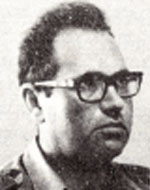DeLeon, Baruch
Baruch, son of Deborah and Ya’akov Tzvi zt “l, was born on the 22nd of Tishrei 5636 (October 22, 1935) in Jerusalem, Baruch was drafted into the Israel Defense Forces in early April 1953. He served as a field engineering instructor at the Engineering Corps training base, and in 1954 he completed an officers ‘course at the IDF officers’ school. In 1957, he completed his regular service, but a year later he volunteered to serve in the army as part of the engineering corps. He decided to tie his fate in the service of the Israel Defense Forces, in which he combined his organizational ability and his ability to think, his strong belief in the power of the people of Israel and his army to defend themselves against any enemy. In 1959 he married Rachel, who accompanied him on his long journey. Together with her he built their home, where their children Yaakov, Amit and Ayelet were born and raised. During his long service in the career army, he served as a commanding officer in the IDF’s Chief of Staff and in the combat unit of the Israel Defense Forces. In these positions he was promoted to the rank of Major. In 1965 he successfully completed his studies at the Command and Staff School. Afterward he was sent by the IDF for academic studies and graduated cum laude with a BA in History and History of the Jewish People in 1968. In 1968, he was appointed commander of an engineering battalion and promoted to lieutenant colonel. “M). Baruch was the man of the Safra and the Seifah. He was an excellent commander and a fearless fighter and yet a spiritual man and a scholar. He has the ability to think and the ability to analyze and distinguish between treatment and the essential. He knew how to get to the bottom of things, had a wondrous memory and a rare ability to wonder quickly about the nature of things. As a commander, he was shown to have the ability to organize leadership, was calm and cool and gave an atmosphere of security to his subordinates. He was an expert on the problems of the individual as a mission and as a mission to the IDF commander, and was therefore interested in the problems that plagued every soldier of his soldiers, who was familiar with the daily problems of his subordinates, Becky, who taught in the IDF Corps of Engineers and senior IDF commanders, was recognized for his many skills and ability The big one and expected him to advance quickly in the ranks. On the Day of Atonement, he was called to fight from the morning prayers at the Chabad synagogue in Petach Tikvah, where he regularly prayed, Baruch served as an engineering officer in the divisionAnd was responsible for the construction of the bridge over which the IDF soldiers crossed the Suez Canal, and was responsible for transferring the means of success to the canal and completing the task imposed on him, despite the heavy fire that was inflicted on him and his subordinates and the losses they sustained. A great bar-mitzvah for his eldest son, Jacob-Zvi, who reached the mitzva on the 11th of Tishrei, but was forced to give up because of the war and did not celebrate with his son. On the 18th of Tishrei 5734 (18.10.1973), on the eve of his 38th birthday, Baruch was injured standing in a mausoleum that served as a bridgehead for the channel’s visitors. He was operated on his neck, and when he was awake, he spoke to his friends and soldiers and asked them, “What are you doing on the ground, children?” Then he asked them to let him know about his injuries. But shortly afterwards he lost consciousness and died. He was laid to rest at the Mount Herzl cemetery in Jerusalem. He left behind a wife, two sons and a daughter, a mother, two sisters and a brother.
